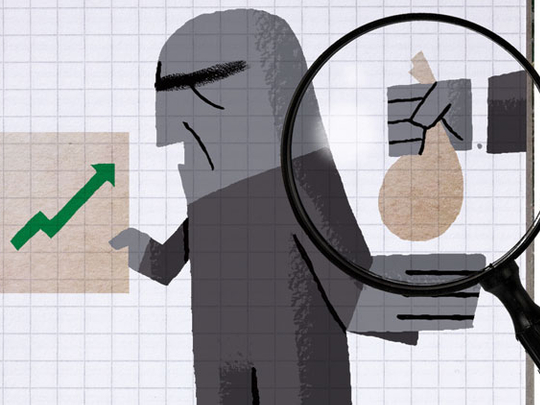
Corruption is a significant threat to any country’s overall wellbeing and development. Defined as the abuse of public office for private gain or the abuse of entrusted power for private gain, the threat of corruption has risen in media reports in Saudi Arabia, with cases of public and private sector fraud reported almost daily.
Reported events of corruption in just a week highlight how big this problem is becoming. Take for example the following actual cases of fraudulent practices: In one city, 30 private schools were found to be directly or indirectly involved in fabricating false statistics on Saudisation employment ratios. The records indicated that the schools employed over 2,000 Saudi teachers, but they were not actually working for them.
The average monthly salary the schools paid these non-teachers was 2,000 Saudi riyals (Dh1,958) while the schools received 2,500 riyals in assistance from the Human Resources Development Fund for each Saudi teacher employed. Two government agencies have started investigations into these cases.
In the city of Jazan, heath inspectors seized large quantities of expired and unfit for consumption baby milk from several pharmacies. The director of Health Affairs in the region promised that the directorate would impose heavy penalties and fines on all violators who blatantly disregard children’s health and safety. The cases have been referred to the pertinent authorities within the directorate for action.
In yet another city, an official committee was quickly formed to closely monitor the bank accounts of 12 senior government officials. The accounts were put under scrutiny after sharp increases in deposits over a short span of time were detected. It was reported that some of the officials had more than 35 million riyals in their bank accounts, with no means of income other than their government salary. The committee also discovered that the officials had illegally forged deeds in their names of large plots of land with areas estimated to be over 10,000 sq metres.
A few days ago, a newspaper broke out a story that there were more than 800 so called engineers in the kingdom working with bogus university degrees. It also said there were hundreds of PhD degree holders in the kingdom from bogus universities. There were also thousands of supposedly skilled expatriate workers who arrived with fake diplomas and experience certificates.
The report concluded that ‘a driver may turn out to be a guard while the barber may be a plumber who was actually only a porter. We may discover that the foreigner whom we have contracted as a medical doctor is, in fact, a grave digger!’
The Ministry of Commerce announced last week that its inspectors had confiscated a trailer full of adulterated rice with different labels of popular brands being sold in the kingdom. According to reports, the authorities have increased their diligence in monitoring rice supplies in the kingdom in an effort to stop the sale of adulterated and substandard rice.
The Ministry statement added that inspecting teams had followed a vehicle to a warehouse in the southern suburbs of the capital, the main hub for distribution of substandard quality rice to various shops. “The sub-standard rice is repackaged and carries labels of popular brands,” the ministry said. More than 40 tonnes of rice was seized at the warehouse which was being run by Arab nationals. Needless to say, the owner is now a fugitive of law.
The Saudi Food and Drug Authority (SFDA) recently warned the public against drinking water manufactured by 14 factories in the country. The reason? The water contained a high ratio of bromate, a source of highly carcinogenic substances. Some social scientists and media figures have begun stressing the dangers of cheating and fraud on the moral fabric of the community.
Dr Khalid M. Batarfi, a popular professor and media figure recently wrote “Many students believe it is acceptable to copy research from the internet, pay professionals to complete assignments, use smart phones and hidden notes during exams or copy from classmates. They do know that it is sinful (haram) to cheat, but somehow it doesn’t bother their conscience.”
He added that “as for lying, it is becoming a norm of life in the new generation. Media, politicians, opinion leaders, elders, even educators and religious scholars lie, now and then, about serious matters that affect our lives and well-being, so how dare we blame a student for lying about his class absence or late report?”
Another wrote: “The number of crimes like rape, sexual harassment, and blackmail could be reduced if the criminals are named and shamed. I believe that greedy and deceitful businessmen who cheat customers should be named and shamed and so are money launderers and those involved in fake Saudisation because they are doing a lot of damage to society.” He is a strong proponent of publicly naming and shaming corrupt officials in the media.
With Saudi Arabia ranking 63rd in the 2013 global Corruption Perceptions Index and well below its GCC neighbours, perhaps it is time that such measures are considered and sanctioned by the government to fight the growing menace.
Tariq A. Al Maeena is a Saudi socio-political commentator. He lives in Jeddah, Saudi Arabia. Follow him on Twitter at www.twitter.com/@talmaeena








